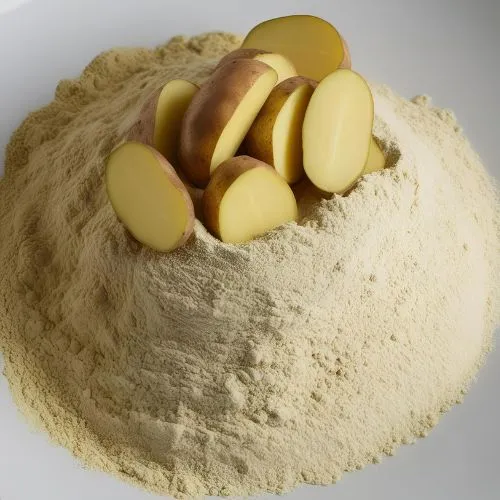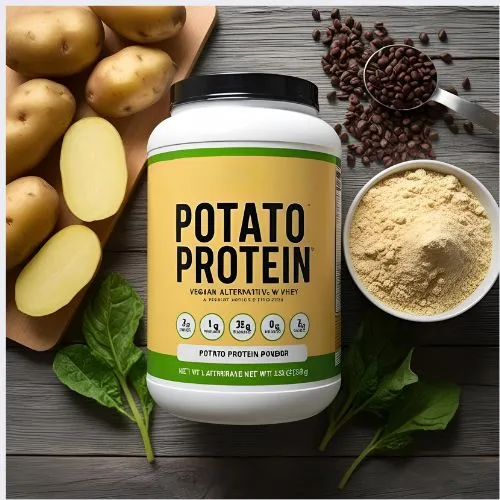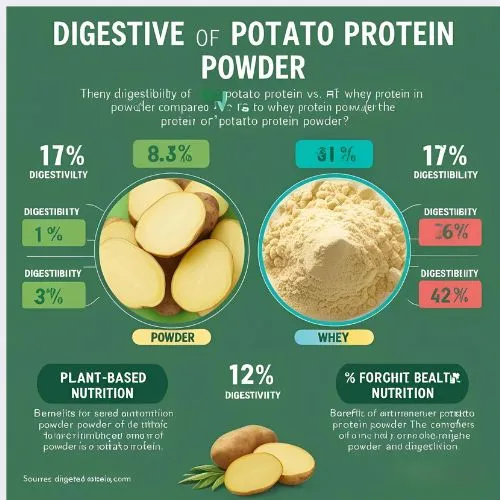Potato Protein Powder vs. Whey: Which Is Better?
In the world of protein supplements, whey has long been the reigning champion. However, a new contender has entered the arena: potato protein powder. This plant-based alternative is gaining traction among fitness enthusiasts and health-conscious individuals alike. But how does it stack up against the tried-and-true whey protein? Let's dive into the comparison and explore which option might be better for your needs.

Potato Protein Powder: A Vegan Alternative to Whey
Potato protein powder is a relatively new player in the protein supplement market, offering a vegan-friendly option for those seeking plant-based alternatives. Unlike whey, which is derived from milk, potato protein is extracted from potatoes, making it suitable for those following a vegan lifestyle or individuals with dairy allergies or intolerances.
Nutritional Profile of Potato Protein
Potato protein powder boasts an impressive nutritional profile. It contains all nine essential amino acids, making it a complete protein source. While the exact composition may vary depending on the brand, potato protein typically offers around 20-25 grams of protein per serving. It's also low in fat and carbohydrates, making it an excellent option for those watching their calorie intake.
Environmental Impact
One of the significant advantages of potato protein powder is its lower environmental impact compared to whey protein. The production of potato protein requires less water and land use than dairy-based proteins, making it a more sustainable choice for environmentally conscious consumers.

How Potato Protein Powder Supports Muscle Growth?
When it comes to muscle growth and recovery, protein quality and amino acid profile are crucial factors to consider. Let's examine how potato protein powder measures up in supporting muscle development.
Amino Acid Profile
Potato protein contains a balanced amino acid profile, including branched-chain amino acids (BCAAs) that are essential for muscle protein synthesis. While the BCAA content in potato protein is slightly lower than in whey, it still provides a sufficient amount to support muscle growth and recovery.
Muscle Protein Synthesis
Studies have shown that potato protein can effectively stimulate muscle protein synthesis, albeit at a slightly lower rate than whey protein. However, the difference may not be significant enough to deter those seeking a plant-based alternative. When consumed in adequate amounts, potato protein can still contribute to muscle growth and maintenance.
Post-Workout Recovery
Potato protein powder can be an effective post-workout supplement. Its amino acid profile supports muscle recovery and repair, helping to reduce muscle soreness and promote faster recovery times. While whey protein may have a slight edge in terms of absorption rate, potato protein still offers substantial benefits for post-exercise nutrition.

Is Potato Protein Powder Easier to Digest Than Whey?
Digestibility is a crucial factor when choosing a protein supplement, as it affects how well your body can utilize the protein. Let's compare the digestibility of potato protein powder and whey protein.
Digestive Comfort
For many individuals, potato protein powder may be easier on the digestive system compared to whey protein. This is particularly true for those who are lactose intolerant or have sensitivities to dairy products. Potato protein is naturally lactose-free and less likely to cause bloating or gastrointestinal discomfort often associated with whey protein consumption.
Absorption Rate
While whey protein is known for its rapid absorption rate, potato protein is not far behind. The body can efficiently digest and absorb potato protein, making it a viable option for post-workout recovery and muscle support. The slightly slower absorption rate of potato protein may even be beneficial for providing a more sustained release of amino acids to the muscles.
Allergen Considerations
Potato protein powder is an excellent alternative for individuals with common food allergies. It's free from dairy, soy, and gluten, making it a safe choice for those with these allergies or intolerances. This hypoallergenic nature gives potato protein an edge over whey for individuals with sensitive digestive systems or specific dietary restrictions.

Conclusion
In the debate of potato protein powder vs. whey, there's no clear-cut winner. Both options offer unique benefits and can be effective in supporting muscle growth, recovery, and overall nutrition. Whey protein may have a slight edge in terms of amino acid profile and absorption rate, but potato protein powder offers a vegan-friendly, environmentally sustainable, and easily digestible alternative.
Ultimately, the choice between potato protein powder and whey depends on your individual needs, dietary preferences, and goals. If you're looking for a plant-based option that's gentle on the digestive system and environmentally friendly, potato protein powder could be an excellent choice. On the other hand, if you prioritize maximum protein content and don't have any issues with dairy, whey protein might be the way to go.
Remember, the most effective protein supplement is the one that fits seamlessly into your lifestyle and dietary habits. Whether you choose potato protein powder or whey, consistency in your nutrition and training regimen is key to achieving your fitness goals. For more information about potato protein powder and other natural plant extracts, feel free to contact us at info@yanggebiotech.com. Our team at Yangge Biotech Co., Ltd. is dedicated to providing high-quality, innovative solutions for your nutritional needs.
References
1. Guillen, J., & Vazquez, J. (2019). Potato protein: A review of its technological, nutritional and functional properties. American Journal of Potato Research, 96(5), 398-410.
2. Gorissen, S. H., Crombag, J. J., Senden, J. M., Waterval, W. H., Bierau, J., Verdijk, L. B., & van Loon, L. J. (2018). Protein content and amino acid composition of commercially available plant-based protein isolates. Amino Acids, 50(12), 1685-1695.
3. Banaszek, A., Townsend, J. R., Bender, D., Vantrease, W. C., Marshall, A. C., & Johnson, K. D. (2019). The effects of whey vs. pea protein on physical adaptations following 8-weeks of high-intensity functional training (HIFT): A pilot study. Sports, 7(1), 12.
4. Oikawa, S. Y., Bahniwal, R., Holloway, T. M., Lim, C., McLeod, J. C., McGlory, C., ... & Phillips, S. M. (2020). Potato protein isolate stimulates muscle protein synthesis at rest and with resistance exercise in young women. Nutrients, 12(5), 1235.
5. Chung, H. J., Liu, Q., Pauls, K. P., Fan, M. Z., & Yada, R. (2008). In vitro starch digestibility, expected glycemic index and some physicochemical properties of starch and flour from common bean (Phaseolus vulgaris L.) varieties grown in Canada. Food Research International, 41(9), 869-875.

Based on your location and order quantity, you will have the opportunity to receive a limited time free shipping promotion!

Who we are


